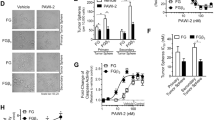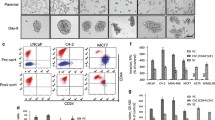Abstract
CD133 expression in pancreatic cancer correlates with poor prognosis and increased metastasis. CD133+ pancreatic cancer cells exhibit cancer stem cell (CSC)-like properties. We established a CD133+ cell-rich subline from Capan-1 pancreatic cancer cells as a pancreatic CSC model and compared the effects of KU-0063794, a dual mTORC1/mTORC2 inhibitor, against those of mTORC1-specific rapamycin. We found that KU-0063794 prevents sphere formation, a self-renewal index, at high concentrations. Rapamycin inhibited sphere formation but to a lesser degree. In the present study, we aimed to determine the mechanistic roles of mTOR complex 2 (mTORC2) in maintaining CSC-like properties. By examining the PI3K/Akt/mTOR signaling pathway, we observed lower Akt phosphorylation in KU-0063794-treated cells. Phosphorylation of mTORC1 downstream effectors was inhibited by both inhibitors. Thus, mTORC2 activates Akt and modulate stem-like properties, whereas mTORC1 downstream signaling correlates directly with stem-like properties.




Similar content being viewed by others
References
Siegel RL, Miller KD, Jemal A. Cancer statistics, 2018. CA Cancer J Clin. 2018;68:7–30.
Cancer Statistics in Japan '18. Cancer Information Service, National Cancer Center, Japan. https://ganjoho.jp/en/professional/statistics/brochure/2018_en.html. Accessed 14 May 2019.
Hermann PC, Huber SL, Herrler T, et al. Distinct populations of cancer stem cells determine tumor growth and metastatic activity in human pancreatic cancer. Cell Stem Cell. 2007;1:313–23.
Li C, Heidt DG, Dalerba P, et al. Identification of pancreatic cancer stem cells. Can Res. 2007;67:1030–7.
Takao S, Ding Q, Matsubara S. Pancreatic cancer stem cells: regulatory networks in the tumor microenvironment and targeted therapy. J Hepatobiliary Pancreat Sci. 2012;6:614–20.
Maeda S, Shinchi H, Kurahara H, et al. CD133 expression is correlated with lymph node metastasis and vascular endothelial growth factor-C expression in pancreatic cancer. Int J Mol Sci. 2008;98:1389–97.
Hayashi T, Ding Q, Kuwahata T, et al. Interferon-alpha modulates the chemosensitivity of CD133-expressing pancreatic cancer cells to gemcitabine. Cancer Sci. 2012;103:889–96.
Ding Q, Yoshimitsu M, Kuwahata T, et al. Establishment of a highly migratory subclone reveals that CD133 contributes to migration and invasion through epithelial-mesenchymal transition in pancreatic cancer. Hum Cell. 2012;25:1–8.
Ding Q, Miyazaki Y, Tsukasa K, Matsubara S, Yoshimitsu M, Takao S. CD133 facilitates epithelial-mesenchymal transition through interaction with the ERK pathway in pancreatic cancer metastasis. Mol Cancer. 2014;13:15.
Mani SA, Guo W, Liao MJ, et al. The epithelial-mesenchymal transition generates cells with properties of stem cells. Cell. 2008;133:704–15.
Morel AP, Lievre M, Thomas C, Hinkal G, Ansieau S, Puisieux A. Generation of breast cancer stem cells through epithelial-mesenchymal transition. PLoS ONE. 2008;3:e2888.
Zhou P, Li B, Liu F, et al. The epithelial to mesenchymal transition (EMT) and cancer stem cells: implication for treatment resistance in pancreatic cancer treatment resistance. Mol Cancer. 2017;1:52.
Matsubara S, Ding Q, Miyazaki Y, Kuwahata T, Tsukasa K, Takao S. mTOR plays critical roles in pancreatic cancer stem cells through specific and stemness-related functions. Sci Rep. 2013;3:3230.
Miyazaki Y, Matsubara S, Ding Q, et al. Efficient elimination of pancreatic cancer stem cells by hedgehog/GLI inhibitor GANT61 in combination with mTOR inhibition. Mol Cancer. 2016;15:49.
Guertin DA, Stevens DM, Saitoh M, et al. mTOR complex 2 is required for the development of prostate cancer induced by Pten loss in mice. Cancer Cell. 2009;15:148–59. https://doi.org/10.1016/j.ccr.2008.12.017.
Manning BD, Toker A. AKT/PKB signaling: navigating the network. Cell. 2017;169:381–405.
Waters AM, Der CJ. KRAS: the critical driver and therapeutic target for pancreatic cancer. Cold Spring Harb Perspect Med. 2018. https://doi.org/10.1101/cshperspect.a031435(pii: a03143518).
Meng D, Frank AR, Jewell JL. mTOR signaling in stem and progenitor cells. Development. 2018. https://doi.org/10.1242/dev.152595(pii: dev15259519).
Sarbassov DD, Guertin DA, Ali SM, Sabatini DM. Phosphorylation and regulation of Akt/PKB by the rictor-mTOR complex. Science. 2005;307:1098–101.
Kruspig B, Monteverde T, Neidler S, et al. The ERBB network facilitates KRAS-driven lung tumorigenesis. Sci Trans Med. 2018. https://doi.org/10.1126/scitranslmed.aao2565(pii: eaao2565).
Moll HP, Pranz K, Musteanu M, et al. Afatinib restrains K-RAS-driven lung tumorigenesis. Sci Trans Med. 2018. https://doi.org/10.1126/scitranslmed.aao2301(pii: eaao2301).
Ruess DA, Heynen GJ, Ciecielski KJ, et al. Mutant KRAS-driven cancers depend on PTPN11/SHP2 phosphatase. Nat Med. 2018;24:954–60.
Acknowledgements
We wish to thank T. Obara and Y. Miyazaki for their cooperation in a part of this study, and Y. Setogawa for her expert secretarial assistance. This work was supported by JSPS Grant-in-Aid for Scientific Research (B) Grant Number 25293288 and (C) Grant Number 26462069 from the Ministry of Education, Culture, Sports, Science and Technology, Japan.
Author information
Authors and Affiliations
Corresponding author
Ethics declarations
Conflict of interest
The authors declare no competing interests.
Additional information
Publisher's Note
Springer Nature remains neutral with regard to jurisdictional claims in published maps and institutional affiliations.
Electronic supplementary material
Below is the link to the electronic supplementary material.
Rights and permissions
About this article
Cite this article
Matsubara, S., Tsukasa, K., Kuwahata, T. et al. Prevention of Akt phosphorylation is a key to targeting cancer stem-like cells by mTOR inhibition. Human Cell 33, 1197–1203 (2020). https://doi.org/10.1007/s13577-020-00416-9
Received:
Accepted:
Published:
Issue Date:
DOI: https://doi.org/10.1007/s13577-020-00416-9




